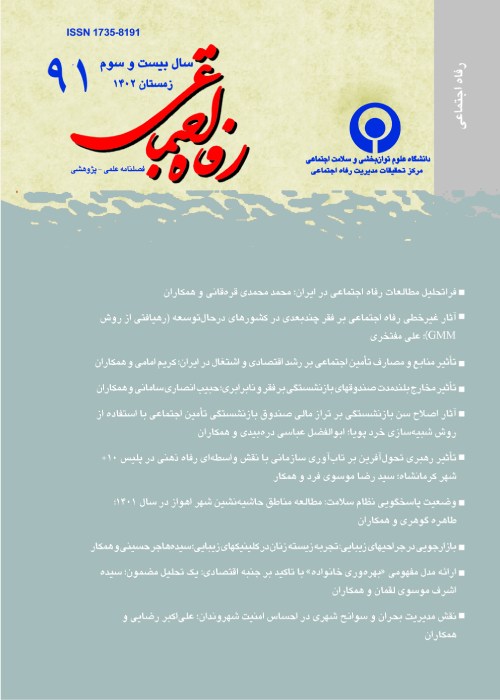Social Capital and Social Welfare
Author(s):
Abstract:
Objective
In the new social welfare, issues of social capital have been important and are very necessary because today not only social welfare can not simply available and can not be guaranteed by direct economic and material components, but in addition the resources of social society including social capital of different groups of people must be mobilized. Several experimental findings are emphasized on the importance of social capital at promoting level of development and welfare of communities. Studies show that the areas or countries with the relatively high storage of social capital (according to generalized trust and civil commitment) obtain higher levels of growth compared with the societies with lower trust and low civil commitment. In this study, the collective social capital approach in which social capital is defined as collective assets that leads to the effects and the consequences through orientation to collective (Putnam theory) due to it’s authenticity to the subject of research, approved as the theoretical framework in relation of explanation and analysis of social welfare situation. In this research social capital, as Putnam defined, is studied as a collective asset. Therefore, conceptual elements of social capital considered as a set of cognitive and subjective dimensions which formed social trust and social norms in the behavior in social network which totally formed the social capital components. The average scores of these three components has been considered as social capital scores. Also in relation of social welfare, the combination of individual’s social welfare (Bentham theory) that their indicators proposed by social statistics center of Euroup, approved for measurement in this research. The general hypothesis is that: social capital has a positive impact on social welfare any higher amount of social capital leads to higher amount of social welfare. In addition to the general hypothesis, some other hypothesis as especial forms of relationships between variables such as individual trust, generalized trust, institutionalized trust, social solidarity, cooperation, social support, formal participation, informal participation, amount and variety of relationships are measured. Method
The methodology of this research is survey and questionnaire is used for data gathering. Statistical community of research are all households residing in Tehran and statistical unit of the research is the head of family. Sample size are 299 cases that selected by cluster sampling. Findings & Results
The results of research as generally indicate the approval of hypothesis and research expectations about the role of social capital in increasing of social welfare. As results of the statistical analysis show the social capital has positive impact on social welfare that is, any higher amount which social capital may be, the rate of social welfare will be higher. Also all the indices considered for social capital(such as trust, social norms, and social networks) have a positive impact on social welfare these results are consistent with Putnam theories. The research shows that some indicators of social capital which have better situation in research community have a more relationship with traditional aspects of society such as religious informal participation and charity affairs and some indicators that are consistent with modern life such as modern social capital (institutional trust, generalized trust, solidarity and formal participation) are not in a desirable situation.Keywords:
Language:
Persian
Published:
Social Welfare Quarterly, Volume:8 Issue: 32, 2009
Page:
109
magiran.com/p1244634
دانلود و مطالعه متن این مقاله با یکی از روشهای زیر امکان پذیر است:
اشتراک شخصی
با عضویت و پرداخت آنلاین حق اشتراک یکساله به مبلغ 1,390,000ريال میتوانید 70 عنوان مطلب دانلود کنید!
اشتراک سازمانی
به کتابخانه دانشگاه یا محل کار خود پیشنهاد کنید تا اشتراک سازمانی این پایگاه را برای دسترسی نامحدود همه کاربران به متن مطالب تهیه نمایند!
توجه!
- حق عضویت دریافتی صرف حمایت از نشریات عضو و نگهداری، تکمیل و توسعه مگیران میشود.
- پرداخت حق اشتراک و دانلود مقالات اجازه بازنشر آن در سایر رسانههای چاپی و دیجیتال را به کاربر نمیدهد.
In order to view content subscription is required
Personal subscription
Subscribe magiran.com for 70 € euros via PayPal and download 70 articles during a year.
Organization subscription
Please contact us to subscribe your university or library for unlimited access!



